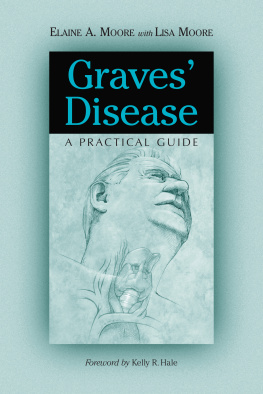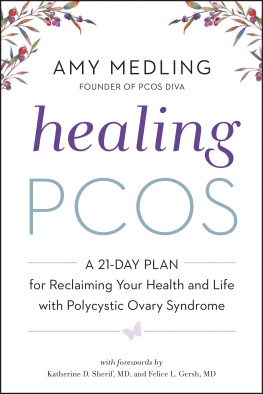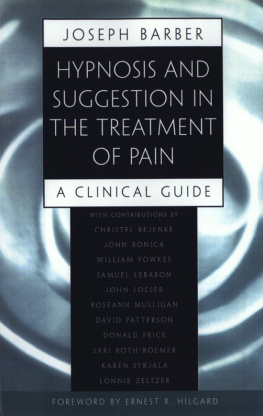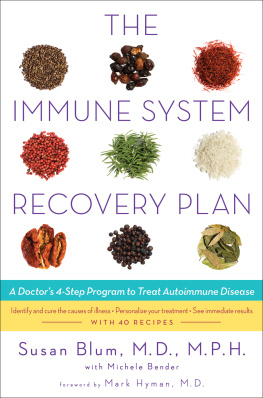Acknowledgments
There are far too many to adequately thank.
First of all, wed like to recognize the ever growing, more cognizant women of America and an astute media health network that has enabled us to help so many thousands of women.
And we would like to acknowledge Dr. Norman Weiss, our co-founder, for his great support and welcome collaboration.
Then for their ever generous and sharing professionalism, we would like to thank our colleagues at PMS Access, specifically Treacy Colbert, Marla Ahlgrimm, and David Myers for their continuing assistance in developing a viable network for PMS patients in the United States, along with other colleagues like Stephanie Bender, Denise Sabal, and Niels Lauerson who have also blazed the path for treatment of PMS patients, and Dr. Turan Itil whose innovative brainmapping allowed us to demonstrate the effects of progesterone on the brain.
But this book could not have been written without Michael Cohn, our agent, whose stewardship provided welcome guidance, and George de Kay, a great editor, fine publisher, and good friend.
The Reality of PMS
PMS is prevalent. PMS is epidemic. PMS involves tens of millions of women. PMS disrupts the lives of a significant percentage of the female population who has it, and adversely affects the lives of the men, women, and children who love them, live with them, and work with them. But theres no doubt that although very common among women from fifteen to fifty-five, PMS is the most frequently misdiagnosed and mistreated illness in America today.
Why do so many well-educated, well-intentioned physicians miss or misdiagnose PMS? To begin with, womens complaints are frequently dismissed. There is a misperception, still present in our medical community, that women are preoccupied with their health. Women are not taken as seriously as men, and consequently doctors frequently dont listen carefully enough when their patients are female.
Furthermore, PMS is often masked by misleading symptoms; it can appear in any combination of more than 140 different signs and symptoms. PMS can involve so many symptoms in the body that many physicians, trained as specialists, refer their PMS patients to another doctor because they dont feel equipped to deal with the many symptoms outside their area.
Getting Past Freud
Finally, in many cases the physician decides that anyone with so many symptoms must need psychiatric help. Nowadays, whenever a woman has an elusive, hard-to-diagnose symptom, physicians generally deem that it must be psychological. Once a woman speaks of anxiety, tension, or depression, she is shuttled into the mental health system, where her physiological complaints are largely ignored.
The thrust of this book will be three-pronged. We will teach you to recognize and strip away the many myths and masks of PMS. Then well equip you to diagnose your own disorder. Finally, well give you a comprehensive treatment program that has brought relief to thousands of women like you who have been treated at our PMS Center.
Searching for Help
Typically, the PMS Center patient comes to us after seeing five previous doctors and spending close to five thousand dollars on ineffective care. Mistreatment ranges from the subtle to the devastating, from the seemingly reasonable to the patently absurd.
Most of the time, the masks of PMS are the problem. PMS normally travels in disguise. Its disguises are numerous and doctors are often fooled by its disguises. A woman with a straightforward, thoroughly treatable case of PMS is often diagnosed as depressive or anxious. You might reasonably assume that such a misdiagnosis is no more than a temporary, minor difficulty. Unfortunately, thats not usually the case. Simply put, the vast majority of American physicians are ill-informed and ill-educated when it comes to PMS. And what they dont know can certainly hurt you.
The Superficial Diagnosis
For instance, you go to a doctor and get a superficial surface diagnosis ... not exactly an incorrect diagnosis but one that doesnt establish the etiology, or cause, of the disorder. You tell the doctor you feel anxious. He or she agrees that you appear especially anxious. But does he or she look for the cause of your anxiety? What if it is caused by PMS or even a sensitivity to a nasal spray such as phenylpropylalanine, which causes anxiety in many women? What is the correct diagnosis?
Or maybe something really steers you wrong, like the chest pains you experience when you have panic attacks. Your heart beats so fast that you think it is going to fly out of your chest. And you go to the doctor. He examines you and does a cardiogram, which is negative, though your heart rate accelerates at times. Then he does a sonogram, which is also negative, but he believes you have a slight heart murmur. Quite mild, he insists. It may be indicative of mitral valve prolapse. In that moment, your whole world darkens. Youve heard the magical word heart and you go into a state of intensified anxiety.
You limit your activities, stop your exercise, and surprisingly, the panic attacks increase. But is mitral valve prolapse the correct diagnosis? You may actually have a masked case of PMS, and, if you do, the misinformation and the help youve received will only make your anxiety worse.
You can unmask PMS if you know exactly what questions from Chapter 22 to ask your doctor.
Thats the reason for writing this book: using our extensive clinical experience developed from years of listening to case histories like yours, we can offer you a complete system that will allow you to avoid misdiagnosis and mistreatment.
The Range of Misdiagnosis
Our patients have been misdiagnosed in every way that women can be misdiagnosedand often with the aid of complex and expensive tests. After the specialists had worked them up, many of these future patients of ours were worried about brain tumors, or multiple sclerosis, or insanity. Neurologists searched their brains with CAT scans and MRIs, while gynecologists searched their reproductive organs. Most frequently, however, they were treated by psychologists, psychiatrists, or therapists for their disturbed mental state. Much of PMStension, depression, irritability, and unpredictable, meteoric mood swingsappears psychological, especially if the mental health professional is unaware of the masks of PMS.
In spite of that appearance, and so many other false appearances, the truth is that the Premenstrual Syndrome is a hormonal disorder and has to do with the imbalance of estrogen and progesterone, the two major female hormones, during the weeks before your period. Neither your nerves nor your genitalsnot even your thoughtsare significantly involved in treating the problem. PMS and hormones are inextricably linked.
The balance of hormones in the body is a delicate one. Nonetheless the majority of women (60 percent) are sufficiently well tuned that they dont feel the sort of discomfort that would cause them to seek help. They go from menarche to menopause without incident. To these women, PMS is not a reality. But 40 percent of all women in the childbearing years do have significant problems, and 10 to 12 percent of women experience such intense PMS that it disrupts their lives and the lives of family, friends, and co-workers.
If youre a woman with such severe PMS, then each month during your premenstruum, youre acutely miserable, difficult to live with, and tormented by a wide variety of physical and psychological symptoms that are too much for anyone person to cope with.
Its important for you to get the help you need. If you arent treated effectively for a condition as serious as PMS, your quality of life can suffer catastrophic consequences.
Why Is PMS So Hard to Diagnose?








